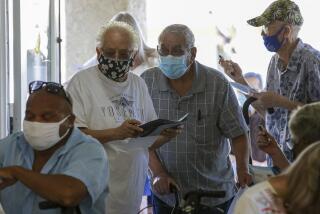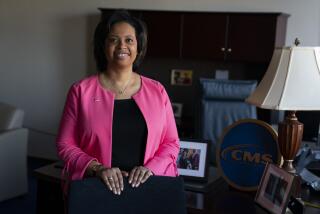Panel Gets Accounting of Medicare Fraud
- Share via
WASHINGTON — Medicare loses a “staggering” $23 billion a year because of errors, waste and fraud, the head of a Senate investigative panel said Thursday, calling for expanded efforts to stop abuses in the huge federal health care program.
Sen. Susan M. Collins (R-Maine), the panel’s chairwoman, and several of her colleagues expressed anger that the amount of waste and theft plaguing Medicare dwarfs the estimated $14 billion that would be saved by controversial changes in the program approved by the Senate this week.
Having voted to make these policy shifts aimed at helping assure Medicare’s financial solvency, the senators were surprised and concerned to learn about the huge drain on the program from fraud and abuse.
“It is disturbing to make tough, tough decisions [on the program] when we are losing $23 billion a year,” said Collins, head of the Senate’s permanent subcommittee on investigations, a unit of the Governmental Affairs Committee.
Thursday’s hearing was the first in an extensive series on Medicare waste and fraud planned by Collins, who is concerned about maintaining the program’s stability as it enters an era when its recipients will double in number over the next 30 years, as the baby boomers begin drawing benefits.
To grapple with this trend, the Senate proposals would force seniors whose annual income exceeds $50,000 for individuals or $75,000 for couples to pay far more for their Medicare coverage, an action that will save the program about $4 billion. And they approved a gradual increase in the age of eligibility, from 65 now to 67 in 2027, that will generate savings of $10 billion over 10 years.
Medicare legislation in the House steered clear of these measures; negotiators for the two chambers will meet next month to develop a single approach to spending for the program under a plan to balance the federal budget in five years.
The traditional rule-of-thumb for Medicare losses has been 10% of program spending. But “even that startling estimate may be too low,” Collins revealed Thursday, citing an unpublished government audit showing improper payments representing 14% of Medicare outlays, or $23 billion a year.
The audit, to be formally published next month by the Department of Health and Human Services, is the most thorough effort yet to discover the extent of losses to Medicare, whether by error or fraud.
The audit found that fraud is greater than previously believed. And witnesses told the panel that illegal billing is increasing rapidly, especially in home health care--Medicare beneficiaries are entitled to medical, nursing, rehabilitation or personal care help at home after certification by a doctor.
Home health care spending has exploded this decade, from $3.5 billion in 1990 to almost $17 billion last year, Michael F. Mangano, Health and Human Services’ principal deputy inspector general, told the subcommittee. As a result, the Medicare system, which serves people age 65 and older and disabled people of all ages, is inundated with so many bills that there is insufficient time and money to audit for mistakes or fraud, he said.
*
Mangano noted that traditional nonprofit agencies, such as visiting nurse services, provided an average of 33 visits per year for each person receiving home care. The newer, for-profit agencies provide an average of 102 visits annually for each person, he said.
The audit found that in four of the nation’s largest states--California, New York, Illinois and Texas--up to 40% of the money spent on home health care is the result of either waste or fraud. Mangano said common violations included ineligible patients receiving services, as well as agencies billing for services not performed or forging statements by doctors claiming the care was needed.
Mangano’s testimony offered a range of other examples of fraud plaguing Medicare. These included:
* A provider of incontinence supplies to nursing homes delivering adult diapers, which cost 7 cents each, and billing Medicare for female urinary collection pouches, which cost $7.
* A company employing psychologists to help nursing-home patients billing for 45-50 minutes of treatment, when the actual sessions were 20-30 minutes. “Some of the psychologists billed for more than 14 hours of therapy a day--one billed for the equivalent of more than 24 hours a day,” Mangano said.
The director of Medicare, Bruce Vladeck, said progress is being made in combating certain types of fraud, such as cases involving wheelchairs and special beds. “There are changes in the trend lines in those areas where we have concentrated investigative resources,” Vladeck said.
Also, the FBI is aggressively attacking health care fraud, with 350 agents now assigned to such cases, up from 112 agents five years ago, Charles L. Owens, chief of the FBI’s financial crimes section, told the subcommittee.
More to Read
Get the L.A. Times Politics newsletter
Deeply reported insights into legislation, politics and policy from Sacramento, Washington and beyond. In your inbox twice per week.
You may occasionally receive promotional content from the Los Angeles Times.










